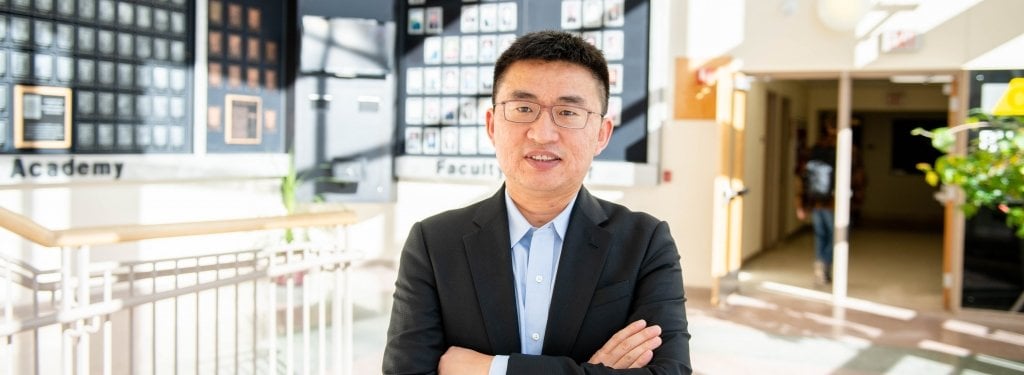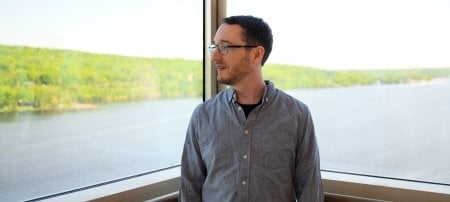A geophysicist who studies cavitation in volcanoes' fluid-filled magmatic cracks and an engineer examining the fluid dynamics and collective behavior of aquatic robot swarms have earned National Science Foundation (NSF) CAREER Awards.
Radwin Askari and Hassan Masoud are Michigan Technological University’s latest CAREER Award recipients. The awards recognize Askari, an associate professor of geological and mining engineering and sciences, and Masoud, an assistant professor of mechanical engineering-engineering mechanics, as early-career faculty who demonstrate the potential to serve as academic role models in research and education, and to lead advances in the mission of their department or organization. The five-year grants will support research work and education outreach.
“Drs. Askari and Masoud join a long line of over 50 Michigan Tech faculty who have received this prestigious national award,” said Dave Reed, vice president for research at Michigan Tech. “The NSF CAREER Award recognizes early-career faculty and is focused on the integration of their teaching and research efforts.”
"Congratulations to Drs. Askari and Masoud for excelling both in serving students and advancing knowledge."

Understanding Volcanoes Through Integrated Physical Modeling
Askari will receive more than $668,000 to continue research in the Physical Modeling Laboratory (PML), which he founded in the Department of Geological and Mining Engineering and Sciences (GMES). For his CAREER project, he’ll develop two analog apparatuses to investigate the cavitation mechanism in fluid-filled magmatic cracks and the developments of sub-cracks and seismic signals that result. Askari said it is crucial to understand both the cavitation mechanism and the dynamics of a volcano’s magmatic crack growth in order to estimate the scale of magma transport.
"The results from this research can improve the forecast of volcanic eruptions, which in turn can help to mitigate their consequent hazards."
The apparatuses Askari develops will help him address more complex scenarios in fracture evolution and their corresponding seismicity, a major step toward his ultimate research goals in the field. He also plans to purchase new lab equipment, including a high-speed imaging system, to substantially enhance the PML’s experimental capacities. Other disciplines across campus, including biomechanics, aerodynamics and fluid dynamics, will also be able to use these advanced tools for future multidisciplinary research collaborations.
Askari plans to promote earth science literacy for students, educators and the public by producing several educational videos and a virtual PML lab tour. He will also offer summer research internships to students from traditionally underserved populations.
Askari said he’s grateful to GMES Chair Aleksey Smirnov, along with Assistant Vice President for Research Development Peter Larsen and colleagues in Tech’s Sponsored Programs Office, for their support and guidance. He also thanked retired GMES staff member Carol Asiala, an assistant research scientist and engineer, for her assistance with the nontechnical parts of his award proposal.
Learn more about the Physical Modeling Laboratory.

Nature Inspires the Exploration of Robotic Swarms
Masoud’s CAREER Award allows him to continue his research into aquatic robots that surf at the air-water interface or swim underwater — a subject of growing interest. “The fundamental knowledge gained during this project will directly contribute to the design and implementation of future aquatic robots capable of functioning alongside each other with a high degree of coordination, similar to the behaviors exhibited by fish in schools and birds in flocks,” Masoud said.
Totaling more than $520,000, the award will be applied to examining the hydrodynamics of aquatic robots moving in orderly ensembles. Masoud aims to identify collective behaviors that emerge from flow-mediated interactions in robot formations.
While robotic systems exist for everything from pizza delivery drones to remotely operated vehicles for sea exploration, Masoud said most of these systems operate individually with little to no intercommunication. It’s a different story in nature, from which his project draws its inspiration. Bird flocks, schools of fish and insect groups, for example, take advantage of proximity and movements to achieve efficiency, accuracy and productivity.
“Researchers are just beginning to comprehend the endless potential of robotic swarms, from biomedical applications and industrial monitoring in hazardous environments to tracking wildlife, navigation, environmental mapping, mining and even search and rescue missions,” said Masoud.
"The design of robots chosen for the studies is motivated by species in nature that have mastered their respective terrains. The swimmers mimic the general form of a fish, with the tail flapping providing the thrust, while the surfers take inspiration from water-walking insects."
Masoud said he’s grateful to Bill Predebon, the recently retired chair of the Department of Mechanical Engineering-Engineering Mechanics, for supporting the preliminary research that resulted in the award. He also credited Larsen’s “brilliant feedback” for leading to a successful proposal.
The outreach component of Masoud’s project will include educational activities with middle and high school students, mentorship of community college and graduate students, and curriculum development. He hopes to advance science literacy for the general public and reinforce the importance of an inclusive, diverse and well-trained workforce through science, technology, engineering and math (STEM) education.
Masoud said the CAREER Award is a gratifying recognition of his research efforts to date, and it is essential to what he endeavors to accomplish in the future. “This award will provide me with the necessary resources to continue conducting fundamental research and to significantly grow my capabilities, establishing myself as an authority in the fields of fluid dynamics and transport phenomena,” he said.
Visit the Complex Fluids and Active Matter Lab.
Michigan Technological University is an R1 public research university founded in 1885 in Houghton, and is home to nearly 7,500 students from more than 60 countries around the world. Consistently ranked among the best universities in the country for return on investment, Michigan's flagship technological university offers more than 120 undergraduate and graduate degree programs in science and technology, engineering, computing, forestry, business, health professions, humanities, mathematics, social sciences, and the arts. The rural campus is situated just miles from Lake Superior in Michigan's Upper Peninsula, offering year-round opportunities for outdoor adventure.






Comments